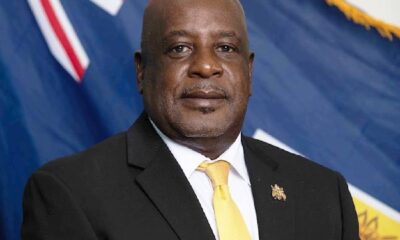Deandrea Hamilton
Editor
December 11, 2024 – A misleading story carried by several US news organisations demanded a firm response by both The Bahamas and Turks and Caicos Islands governments, when news reports cited these countries as among those on a list of possible deportation centers being wooed by the in-coming Trump Administration.
It seemed a mischievous attempt to gaslight these smaller nations about the newly elected president and his popular campaign promise to send illegal migrants home, in massive numbers.
send illegal migrants home, in massive numbers.
Soon, it would be explained that there was no call or direct offer to these governments by the Trump Administration team and, more significantly, no interest by either country to welcome in U.S. deportees. Still both the prime minister of The Bahamas and the Immigration and Border Services minister of the Turks and Caicos Islands immediately issued firm statements rejecting the idea.
“The Government of the Turks and Caicos Islands categorically states that we will not, under any circumstances, accept deportees from the United States or any other nation who are not citizens of Turks and Caicos. Our country’s immigration policies are clear and firmly rooted in the principles of sovereignty, the protection of our borders, and the welfare of our people,” said Arlington Musgrove, TCI Minister of Immigration and Border Services.
There was a similar reaction from The Bahamas; the Office of the Prime Minister informed also there has been no push from the US regarding the request.
“This matter was presented to the Government of The Bahamas but was reviewed and firmly rejected by the Prime Minister.
The Bahamas simply does not have the resources to accommodate such a request. The Prime Minister priorities remain focused on addressing the concerns of The Bahamian people,” said the Office of the Prime Minister.
The Bahamas in a follow up statement gave some history and offered insight on the origin of the proposal, which dates back to the Summit of the Americas staged in Los Angeles two years ago.
“In June of 2022, Prime Minister Philip Davis attended the Summit of the Americas, where regional migration was one of the items on the agenda.
During the Summit, countries were asked to sign a declaration on migration, which included language suggesting that countries support and host undocumented migrants.
The Bahamas did not sign this declaration, although 20 countries in the region did.
The Prime Minister made it clear to President Biden that our country will not bear this burden. We need to devote Bahamian resources to solving Bahamian problems.”
Both The Bahamas and the Turks and Caicos Islands have added to their initial statements, confirming that no one from president-elect Donald Trump’s office had been in communication on the touted plan.
“To be clear, our office responded to the proposal as characterized by the press, rather than any formal proposal made to us by President-elect Trump’s transition team, with whom we have not discussed the matter,” published The Bahamas.
More accurately, there was a news report carried by the BBC which exposed Panama’s experience in this U.S. procedure, which deports illegal migrants to the country where they entered the United States, despite their nationalities.
The BBC news story said: “The Biden administration said it had agreed to pay for the flights as part of its efforts to deter irregular migration.
A group of 29 Colombians with criminal records were the first to be returned on Tuesday.
Under an agreement jointly signed by the Panamanian foreign minister and US Homeland Security Secretary Alejandro Mayorkas, the US has committed to helping Panama with $6m (£4.6m) for equipment, transportation and logistics to “remove foreign nationals who do not have a legal basis to remain in Panama”.
In the case of The Bahamas and The Turks and Caicos Islands, many from these two Small Island Developing States were stunned at the audacity and ramifications of such a plan.
“We are deeply concerned about any suggestion of displacing individuals to countries with which they have no connection. Such policies disregard the cultural, social, and economic implications for receiving countries and the humanitarian impact on the individuals affected.
We remind all stakeholders that Turks and Caicos is already facing significant challenges managing irregular migration and the accompanying strain on our resources. We will not permit external policies to exacerbate these challenges, nor undermine or dictate our national security,” said Minister Musgrove.
One attorney, speaking on a Nassau television show explained that based on current U.S. law, The Bahamas must now do a better job of scrutinising who is allowed into the country, ensuring that these islands are not used as a transit for immigrants who are targetting the United States as their final destination.
Panama’s new president, in a bid to uphold his presidential promise to voters, agreed to end his country being used as a crossing point for Haitians, Venezuelans and Colombians moving from South America into North America.
The BBC said: “Mr Mulino campaigned on a promise to “close” the Darién Gap, the dangerous stretch of jungle which more than half a million migrants crossed last year on their way north from South America.
The Biden administration said it had agreed to pay for the flights as part of its efforts to deter irregular migration.”
It is well known that Haitians, fleeing their poverty stricken island are sometimes successful in making landfall, illegally, in the United States after travelling through the Turks and Caicos and The Bahamas.
If The Bahamas is not careful, it “…could end up being forced to take these immigrants in.”
The Turks and Caicos could heed the same warning.
Statistically though, the number of those departing the neighbouring archipelagos to reside illegally in the U.S. is miniscule, however, it would be well within bounds for ICE (Immigration Customs Enforcement) to deport undocumented individuals back to the country of departure.
Thankfully, most illegal migrants opt to be repatriated to their home country.
It is estimated there are over 11 million undocumented migrants currently in the United States. U.S. president-elect Donald Trump has vowed to start with illegal migrants who are convicted criminals.


 News1 week ago
News1 week ago
 Bahamas News5 days ago
Bahamas News5 days ago
 Bahamas News4 days ago
Bahamas News4 days ago
 Caribbean News1 week ago
Caribbean News1 week ago
 News1 week ago
News1 week ago
 Health4 days ago
Health4 days ago
 News1 week ago
News1 week ago















